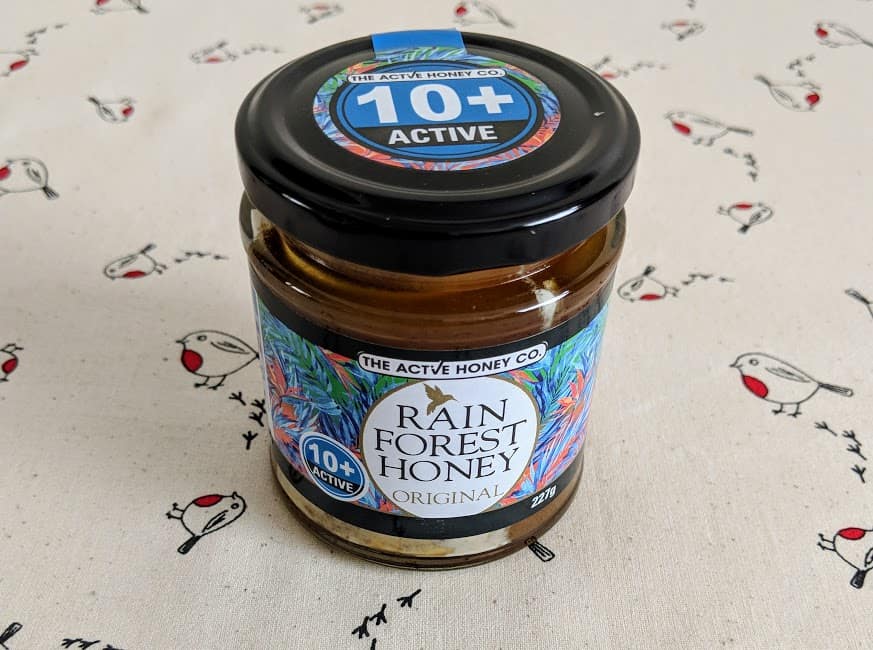Is Honey Healthy? Everything You Need to Know
For thousands of years, humans have been fascinated by honey. Our ancestors would risk life and limb, scaling cliffs and braving swarms of angry bees just for a taste of it. Today, getting our hands on honey is much simpler; it’s right there on the supermarket shelf. But is this ancient treat as good for us as we think? Here I share all you need to know about honey, the ways to use it and honey health benefits you might not have known.

What is Honey?
In simple terms, honey is a sweet, thick liquid made by bees using the nectar of flowering plants. Bees fly from flower to flower, collecting sugary nectar. They store this nectar in a special stomach, where enzymes start breaking it down into simpler sugars. Back at the hive, they pass the nectar to other bees, who continue the process until it’s eventually deposited into a honeycomb.
The bees then fan the honeycomb with their wings to evaporate the excess water, thickening the substance into the honey we know and love. This process not only creates a food source for the bees but also gives honey its unique flavour, colour, and long shelf life.
Honey Nutrition
Honey is primarily composed of sugar, but it’s not just empty calories. A single tablespoon (about 21 grams) of honey contains approximately:
- Calories: 64
- Sugar: 17 grams (mostly fructose and glucose)
- Water: About 17%
While it’s high in sugar, honey also contains small amounts of vitamins, minerals, and other beneficial compounds. The exact nutritional profile can vary widely depending on the type of flowers the bees visited. Generally, you can find trace amounts of:
- Vitamins: B vitamins like riboflavin, niacin, and pantothenic acid.
- Minerals: Calcium, iron, magnesium, potassium, and zinc.
- Antioxidants: These are compounds that help protect your body from damage. Honey is rich in antioxidants called flavonoids and phenolic acids. Darker honey, like buckwheat honey, tends to have a higher antioxidant content.
The main difference between the sugar in honey and regular table sugar (sucrose) is how they are structured. Table sugar is made of glucose and fructose bonded together, while in honey, they are mostly separate. This difference affects how our bodies metabolise them and explains why honey health benefits are making it more and more popular.
Raw Honey vs. Processed Honey: What’s the Difference?
When you’re at the supermarket, you’ll likely see two main types of honey: raw and processed (or regular). The honey health benefits vary depending on the type.
- Raw honey is honey as it exists in the beehive. It’s often just strained to remove large debris like beeswax and dead bees before being bottled. Because it’s unheated and unfiltered, it retains more of its natural goodness, including pollen, enzymes, and a higher concentration of antioxidants. It might look cloudy or have small particles in it.
- Processed honey goes through pasteurisation (heating to high temperatures) and filtration. Pasteurisation kills yeast cells, which extends the shelf life and prevents fermentation. Filtration removes air bubbles and small particles, giving the honey a clear, smooth appearance that many consumers prefer. However, this processing can also destroy some of the beneficial enzymes and antioxidants found in raw honey, reducing the honey health benefits.
So, which is better? If you’re looking for the maximum honey health benefits, raw honey is the clear winner. However, processed honey is still a decent sweetener, just with fewer of the unique perks.
Honey Health Benefits
For centuries, honey has been used in traditional medicine for its healing properties. Modern science is now starting to back up some of these claims, often talking about the honey health benefits, especially with coughs and colds.
A Natural Source of Energy
The sugars in honey, glucose and fructose, are a quick and easily digestible source of energy. This makes it a great natural boost before a workout or when you’re feeling a bit sluggish in the afternoon. Unlike refined sugars that can cause a sharp spike and crash in energy levels, the unique blend of sugars in honey provides a more sustained release.
Rich in Antioxidants
Antioxidants fight against free radicals, which are unstable molecules that can cause cell damage and contribute to ageing and chronic diseases like heart disease and cancer. Honey, particularly darker varieties, is packed with these helpful compounds. Regular consumption has been linked to a lower risk of heart attacks, strokes, and even some types of cancer.
Soothes a Sore Throat and Cough
Remember your Grandma talking about honey health benefits and giving you a spoonful of honey or a warm honey-and-lemon drink when you had a cold? She was onto something. Honey has natural antibacterial properties and its thick consistency helps coat the throat, providing relief from irritation. The World Health Organization (WHO) even recommends honey as a natural cough remedy for children over one year of age. Studies have shown it can even be more effective than some over-the-counter cough medicines.
Good for Your Gut
Honey contains prebiotics, which are substances that feed the good bacteria in your gut. A healthy gut microbiome is essential for digestion, immune function, and even mental health. By promoting the growth of beneficial bacteria like bifidobacteria and lactobacilli, honey can contribute to a healthier digestive system.
Helps with Wound Healing
Applying honey to wounds is an ancient practice that’s still used today. Its natural antibacterial and anti-inflammatory properties create a protective barrier, keeping the wound clean and promoting faster healing. Medical-grade honey, like Manuka honey, is even used in hospitals to treat burns, ulcers, and other skin conditions.

Honey and Weight Loss: Good or Bad?
With its high sugar content, you might think honey is a definite no-go on a weight loss diet. But it’s not that simple. When used wisely, honey can be a useful tool.
The key is moderation. Honey is still a source of calories, and consuming too much will hinder your weight loss efforts. However, swapping refined sugar for honey can have some advantages.
Honey has a slightly lower glycaemic index (GI) than sugar, which means it raises blood sugar levels more slowly. This can help you avoid the sharp spikes and subsequent crashes that lead to cravings for more sugary foods. Some studies also suggest that honey can help regulate appetite hormones, making you feel fuller for longer.
A warm glass of water with honey and lemon in the morning is a popular home remedy for weight loss. While it’s not a magic potion, it can help hydrate you and kick-start your metabolism for the day.
If you’re on a weight loss journey, you don’t have to completely banish honey. Use it sparingly as a natural sweetener in place of sugar, and you can still enjoy its flavour and honey health benefits without sabotaging your goals.
Why Isn’t Honey Vegan?
This is a common point of confusion. Since honey comes from bees and not another animal’s body, why isn’t it considered vegan?
Veganism is a lifestyle that seeks to exclude, as far as is possible and practicable, all forms of exploitation of, and cruelty to, animals for food, clothing, or any other purpose. From this perspective, honey is an animal product. Bees produce honey as their primary food source to survive the winter. When humans harvest honey, we are taking the food that bees have worked hard to create for themselves.
Many commercial honey producers replace the harvested honey with a sugar substitute, like high-fructose corn syrup, which lacks the essential nutrients found in honey. This can negatively impact the bees’ health and immune systems. Furthermore, large-scale beekeeping practices can sometimes harm or kill bees during the honey extraction process.
For these ethical reasons, most vegans choose to avoid honey and opt for plant-based sweeteners like maple syrup, agave nectar, or date syrup instead. That said, some might overlook this because they feel the hjoney health benefits are necessary.
How to Use Honey as a Sugar Alternative
Ready to start using honey in place of sugar? It’s a great way to reduce your intake of refined sweeteners. Here are some tips on how to do it right, especially in your drinks.
How Much Honey to Use?
Honey is sweeter than sugar, so you don’t need to use as much. A good rule of thumb is to use about half to two-thirds of the amount of sugar called for. For example, if you normally put two teaspoons of sugar in your tea, try starting with one teaspoon of honey.
You can always add more if it’s not sweet enough for your taste. It’s easier to add sweetness than to take it away! Even this small amount with give you some of the honey health benefits I shared above.
Dissolving Honey in Drinks
Honey dissolves best in warm or hot liquids. Simply stir it into your tea, coffee, or warm water until it’s fully incorporated. For cold drinks like iced tea or smoothies, it can be a bit trickier, as the honey may clump at the bottom.
To avoid this, you can make a simple honey syrup. Just mix equal parts honey and warm water until the honey is dissolved. Let it cool, and then you’ll have a liquid sweetener that mixes perfectly into cold drinks. You can store this syrup in an airtight container in the fridge for a couple of weeks.
What to Look for When Buying Honey
The honey aisle can be overwhelming, with so many jars, bottles, and bears to choose from. Here’s what to keep in mind:
- Look for “Raw”: If you want the full spectrum of honey health benefits, choose one that’s labelled “raw” and “unfiltered.”
- Check the Origin: Honey from different regions and flowers will have different tastes. Clover honey is mild and light, while buckwheat honey is dark and robust. Experiment to find your favourite!
- Support Local: Buying honey from local beekeepers is a great way to support small businesses and get a product that is fresh and minimally processed. It also means the honey contains local pollen, which some people believe can help with seasonal allergies (though scientific evidence is mixed). One of the honey health benefits that many people talk about and find helpful.
- Beware of Fake Honey: Unfortunately, some products labelled as honey are actually adulterated with cheap syrups. Look for brands you trust and be wary of unusually low prices. Pure honey will often crystallise over time, which is a natural process and not a sign of spoilage. You can easily turn it back into liquid by placing the jar in a bowl of warm water and keep enjoying those honey health benefits without replacing the jar.
Enjoying Honey
Honey is a truly remarkable food. It’s a delicious natural sweetener that, when used in moderation, offers a host of health benefits that you won’t find in a bag of sugar. From boosting your energy and soothing a cough to supporting your gut health, honey has so many benefits.
Whether you drizzle it on your porridge, stir it into your tea, or use it in a salad dressing, honey is a versatile ingredient that can add a touch of natural sweetness to many dishes or drinks.
Do you enjoy honey health benefits or were you not aware how amazing it is? Let me know in the comments below and if there are any honey health benefits you have found that I have missed be sure to share them too.






